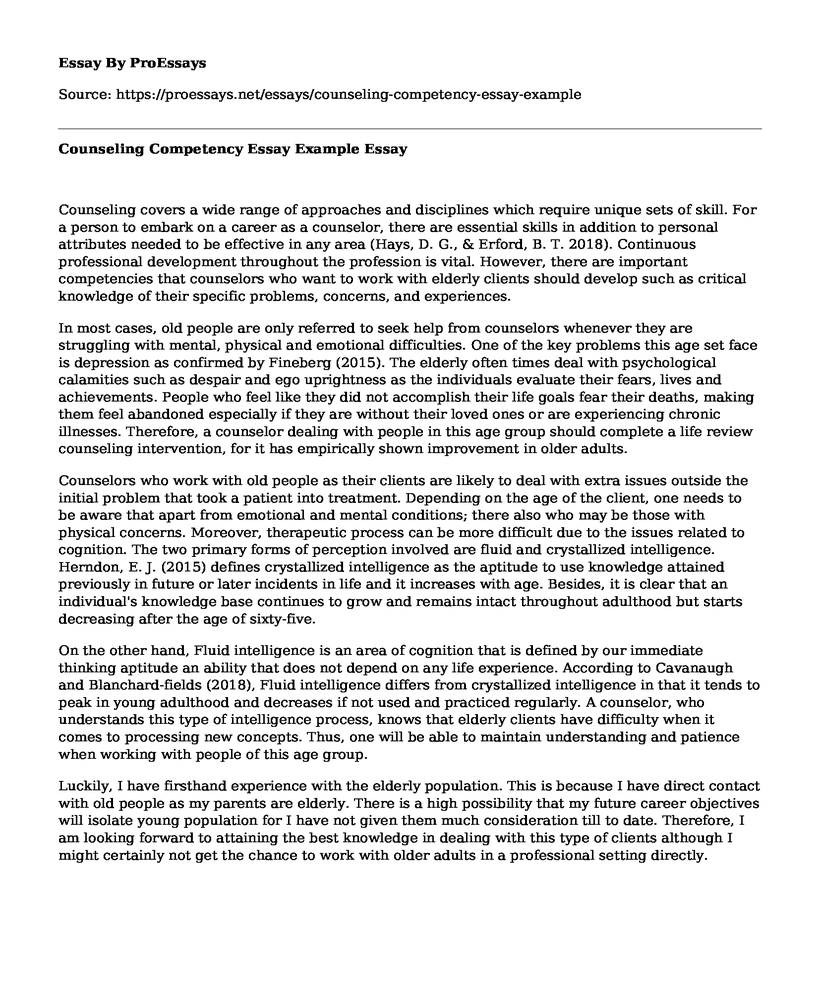Counseling covers a wide range of approaches and disciplines which require unique sets of skill. For a person to embark on a career as a counselor, there are essential skills in addition to personal attributes needed to be effective in any area (Hays, D. G., & Erford, B. T. 2018). Continuous professional development throughout the profession is vital. However, there are important competencies that counselors who want to work with elderly clients should develop such as critical knowledge of their specific problems, concerns, and experiences.
In most cases, old people are only referred to seek help from counselors whenever they are struggling with mental, physical and emotional difficulties. One of the key problems this age set face is depression as confirmed by Fineberg (2015). The elderly often times deal with psychological calamities such as despair and ego uprightness as the individuals evaluate their fears, lives and achievements. People who feel like they did not accomplish their life goals fear their deaths, making them feel abandoned especially if they are without their loved ones or are experiencing chronic illnesses. Therefore, a counselor dealing with people in this age group should complete a life review counseling intervention, for it has empirically shown improvement in older adults.
Counselors who work with old people as their clients are likely to deal with extra issues outside the initial problem that took a patient into treatment. Depending on the age of the client, one needs to be aware that apart from emotional and mental conditions; there also who may be those with physical concerns. Moreover, therapeutic process can be more difficult due to the issues related to cognition. The two primary forms of perception involved are fluid and crystallized intelligence. Herndon, E. J. (2015) defines crystallized intelligence as the aptitude to use knowledge attained previously in future or later incidents in life and it increases with age. Besides, it is clear that an individual's knowledge base continues to grow and remains intact throughout adulthood but starts decreasing after the age of sixty-five.
On the other hand, Fluid intelligence is an area of cognition that is defined by our immediate thinking aptitude an ability that does not depend on any life experience. According to Cavanaugh and Blanchard-fields (2018), Fluid intelligence differs from crystallized intelligence in that it tends to peak in young adulthood and decreases if not used and practiced regularly. A counselor, who understands this type of intelligence process, knows that elderly clients have difficulty when it comes to processing new concepts. Thus, one will be able to maintain understanding and patience when working with people of this age group.
Luckily, I have firsthand experience with the elderly population. This is because I have direct contact with old people as my parents are elderly. There is a high possibility that my future career objectives will isolate young population for I have not given them much consideration till to date. Therefore, I am looking forward to attaining the best knowledge in dealing with this type of clients although I might certainly not get the chance to work with older adults in a professional setting directly.
Conclusion
In conclusion, it is clear that counselors who aspire to work with older adults should develop vital competences such as critical knowledge of their specific problems, concerns, and experiences. This is due to the fact that only when the old people are struggling with physical, psychological and emotional issues are recommended to seek help from a professional counselor. Therefore, Counselors dealing with such clients must portray understanding and patience when working with people of this age group.
References
Cavanaugh, J. C., & Blanchard-Fields, F. (2018). Adult development and aging. Cengage Learning.
Fineberg, N. A., Reghunandanan, S., Simpson, H. B., Phillips, K. A., Richter, M. A., Matthews, K., ... & Sookman, D. (2015). Obsessive-compulsive disorder (OCD): practical strategies for pharmacological and somatic treatment in adults. Psychiatry research, 227(1), 114-125.
Hays, D. G., & Erford, B. T. (2018). Developing multicultural counseling competence: A systems approach (3rd ed.). Upper Saddle River, NJ: Pearson. ISBN: 9780134523804.
Herndon, E. J. (2015). Mindfulness And Cognitive Aging.
Cite this page
Counseling Competency Essay Example. (2022, Jul 25). Retrieved from https://proessays.net/essays/counseling-competency-essay-example
If you are the original author of this essay and no longer wish to have it published on the ProEssays website, please click below to request its removal:
- Research Paper on Stress and the Impacts It Has on the Quality of Life
- The Effects of Divorce on Children Paper Example
- Adolescent Suicide: Ethics in Nursing Essay Example
- Essay Example on Elevating My Literacy: An Editor, My Parents, and Me
- Essay Example on Ageing Mobility: Key to Global Age-Friendly Cities Project
- Book Review Example: Reconstructive Memory: Impacts of Cognitive Processes
- Essay Example on Socialization: The Key to Human Well-Being and Success







